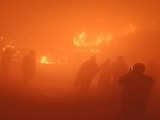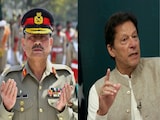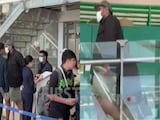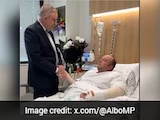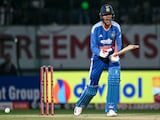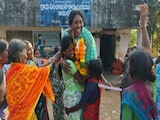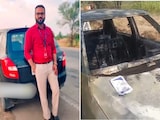As NDTV visited a hospital in Kashmir it found that much needed medicines were not available
Srinagar:
As hospitals in Kashmir are flooded with thousands injured in clashes with security forces, NDTV did a reality check on the government's claim that there is no dearth of medicines across the medical centres in the Valley, and found contradictory results.
NDTV went to the only bone and joint hospital in Kashmir where over 60 bullet injury victims are undergoing treatment. The display board at the hospital entrance lists all available medicines but the patients say the reality is different.
Inside a ward, where critically injured patients are undergoing treatment, we met Ashiq, shot in the leg. His brother Manzoor told us that of the four medicines prescribed to him just one is being provided by the hospital.
"Only Ampkacin injections are being provided by the hospital, rest of the prescribed medicines we purchase from the market", Mr Ahmad said.
And as we were speaking to them, a doctor stepped in, checked Ashiq and prescribed two more medicines, of which just one was available at the hospital.
However, Jammu and Kashmir health minister Bali Bhagat claims that all hospitals in the Valley have adequate stock of medicines.
"I have given clear directions that all the hospitals of Kashmir should have adequate medicines available. Directions have also been given that if there is a shortage of any medicine or drug, the hospital must purchase locally from the market for the patients," Mr Bhagat said.
Another patient Amir has a similar story to share. His family says they are buying most medicines from outside hospital.
"We have got all medicines from the market, we are not given any medicines by the hospital," said Bilal Lone, Amir's father.
But help has come from voluntary organisations which have put up stalls in the hospital campus providing medicines free of cost.
"Refflin and Mentrogel are the medicines which are needed the most, those are not given to the patients by the hospitals, we provide them," said Mohammad Iqbal, a volunteer.
NDTV went to the only bone and joint hospital in Kashmir where over 60 bullet injury victims are undergoing treatment. The display board at the hospital entrance lists all available medicines but the patients say the reality is different.
Inside a ward, where critically injured patients are undergoing treatment, we met Ashiq, shot in the leg. His brother Manzoor told us that of the four medicines prescribed to him just one is being provided by the hospital.
"Only Ampkacin injections are being provided by the hospital, rest of the prescribed medicines we purchase from the market", Mr Ahmad said.
And as we were speaking to them, a doctor stepped in, checked Ashiq and prescribed two more medicines, of which just one was available at the hospital.
However, Jammu and Kashmir health minister Bali Bhagat claims that all hospitals in the Valley have adequate stock of medicines.
"I have given clear directions that all the hospitals of Kashmir should have adequate medicines available. Directions have also been given that if there is a shortage of any medicine or drug, the hospital must purchase locally from the market for the patients," Mr Bhagat said.
Another patient Amir has a similar story to share. His family says they are buying most medicines from outside hospital.
"We have got all medicines from the market, we are not given any medicines by the hospital," said Bilal Lone, Amir's father.
But help has come from voluntary organisations which have put up stalls in the hospital campus providing medicines free of cost.
"Refflin and Mentrogel are the medicines which are needed the most, those are not given to the patients by the hospitals, we provide them," said Mohammad Iqbal, a volunteer.
